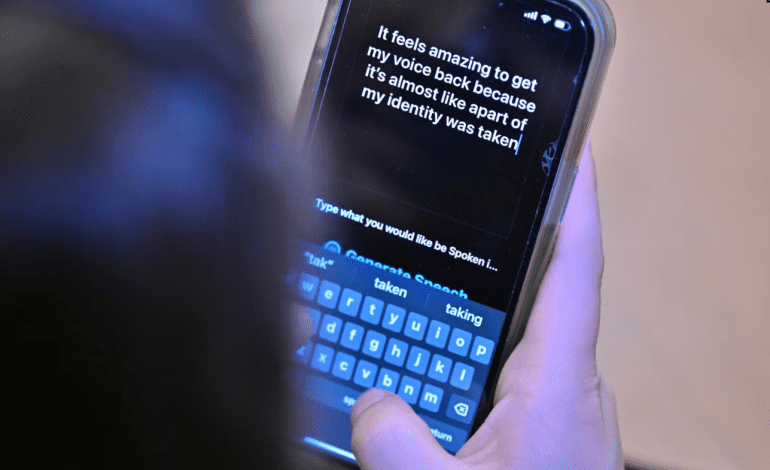- AI assists individuals, like Lexi Bogan, who lose their ability to speak post-surgery.
- Bogan, a 21-year-old from Rhode Island, regained her voice with the help of AI technology.
- Utilizing a text-to-voice app powered by OpenAI, Bogan can communicate verbally by typing words on her phone.
- The app, incorporating a snippet of Bogan’s voice from a teenage cooking video, showcases AI’s potential in healthcare.
- Dr. Rohaid Ali underscores Bogan’s case as emblematic of AI’s ability to aid millions with speech impairments.
- Despite concerns about misuse, Dr. Fatima Mirza emphasizes AI’s societal benefits in restoring authentic voices.
- Bogan anticipates further advancements in AI, envisioning a future where individuals can transcend the limitations of their youthful voices.
Main AI News:
Artificial Intelligence (AI) is often associated with concerns regarding the replication of human voices, termed “deepfakes,” where AI generates false recordings of statements individuals never made. However, a growing number of narratives highlight AI’s role in aiding individuals who have lost their ability to speak, offering them a semblance of their former voice.
Take, for instance, the case of Alexis “Lexi” Bogan, a 21-year-old from Rhode Island. A lover of music and an active singer, Bogan’s life took a turn when she underwent brain surgery to remove a tumor last August. While the operation was successful, the removal of a breathing tube post-surgery left her struggling to articulate words.
Collaborating with therapists, Bogan made progress in regaining speech, but her previous vocal abilities seemed irretrievable. However, a recent development brought hope as experts utilized AI to craft a solution tailored to her needs. Employing a text-to-voice app powered by OpenAI’s technology, Bogan can now communicate verbally by typing words on her phone, a significant milestone in her recovery journey.
The app, utilizing a snippet of Bogan’s voice from a teenage cooking video, exemplifies the transformative potential of AI in healthcare. Dr. Rohaid Ali, a neuroscience trainee at Brown University’s medical school, lauds Bogan as a “trailblazer” whose case underscores AI’s capacity to aid millions afflicted by conditions impairing speech.
Despite acknowledging potential misuse, Dr. Fatima Mirza underscores the societal benefit AI confers, providing individuals like Bogan with a semblance of their authentic voice. Bogan herself acknowledges the emotional resonance of reclaiming her voice, expressing gratitude for the newfound confidence the app instills.
Looking ahead, Bogan envisions continued advancements in AI technology, anticipating a future where individuals like her won’t be constrained by the voice of their youth. As efforts to expand accessibility to such innovations persist, Bogan remains optimistic about the broader impact on those reliant on artificial voices.
While the journey towards full vocal recovery may be ongoing, for Bogan, the app represents more than just a tool—it symbolizes a pathway to rediscovering her voice and, ultimately, her identity.
Conclusion:
The integration of AI in post-surgery speech recovery, as exemplified by Lexi Bogan’s case, signals a significant advancement in healthcare technology. This innovation not only offers practical solutions for individuals with speech impairments but also underscores the broader societal benefits of AI applications in healthcare. As the technology continues to evolve, there is immense potential for market growth in AI-driven healthcare solutions tailored to specific medical needs.

